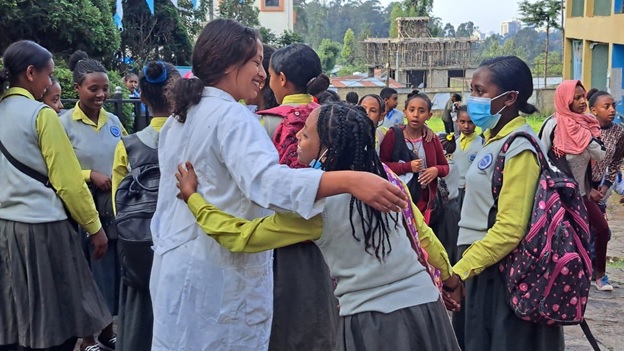
Excelling in education can be attributed to many factors aside from a student’s personal effort, commitment, perseverance and other circumstances. Equally important, enticing teaching and learning environments, the quality of learning has a huge impact on the performances of learners. The resources we allot in the education system, school facilities and materials, the quality of human power engaged in the teaching-learning process could decide the output in many ways.
Countries around the world are working round the clock to make sure citizens get quality education and produce skilled, competitive human capital that could shoulder the development of the country.
With this perspective, in Ethiopia various efforts have been underway to close the gaps witnessed in the education sector and standards of schools.
In his recent remark made in relation to factors that may affect the teaching and learning processes in schools, Education Minister, Birhanu Nega reflected the undesirable impacts of environmental factors.
According to him, the unfavorable condition for learning and teaching process in schools, such as high quality infrastructure, has negative impacts on students’ competency and it is one of the reasons identified by the Ministry for poor quality of education in the country.
He pointed out that, over 86% of primary and secondary schools nationwide have no favorable infrastructure facilities for learning and teaching.
To improve the quality of education, it is necessary to upgrade the schools. And to make this happen, a national public mobilization initiative, known as ‘Education for Generations’, was launched. The campaign was geared up to improve the infrastructure of over 50,000 schools with the participation of all citizens and organizations, and upgrade the status of all schools within a five year period through the national initiative.
Addis Ababa City Administration Public Relation and Communication Directorate Abebe Cherinet said that, during the break time of schools following the Ethiopian rainy season, various rehabilitation activities of school compounds and supplying of schools with the required inputs were made to make schools conducive for teaching learning process and create a decent learning environment.
He further noted that, to ensure the participation of all pertinent stakeholders, informative meetings were conducted with school community, families, community leaders as well as peace and security institutions.
The campaign, ‘Education for Generation’, was productive and instrumental in mobilizing resources and creating an informed community and ensuring education quality. It lets all Ethiopians contribute ideas, resources and energy in revitalizing each school system, regardless of distance.
The Bureau has been urging fellow citizens to use the Ministry’s portal to access and pledge their support for the schools located in the urban and the hinterlands of the country.
“Yesterday formal education has commenced and students are getting back to school after a recess of close to three weeks. The Bureau calls on all stakeholders to walk the talk.”
He further noted that, the productivity of students is not only measured by simply assessing their academic performance; but it is the cumulative effects of hard work in assignments, school projects, and other extracurricular activities. Thus, guardians and families should buckle up efforts to support students in the new academic year.
He finally said, the Bureau will keep on working with all stakeholders and supply inputs to each school in the city.
Speaking to the media, Addis Ababa City Administration Education Bureau Head Zelalem Mulatu (PhD) for his part said that coordinated efforts are underway to ensure a peaceful teaching-learning process in schools’ compounds.
“Ensuring quality and the participation of the public will be the task that we give it due emphasis,” he underlined.
The fate of the country is in the hands of the new generation. The Bureau is working to equip the posterity as per the set standard ready for the world of work. It strives to equip students with the skills they need to become active, responsible and engaged citizens.
“We know education has a vital role to play in developing the knowledge, skills, attitudes and values that enable people to contribute their share and benefit from an inclusive and sustainable future. Learning to form clear and purposeful goals, work with others with different perspectives, find untapped opportunities and identify multiple solutions to big problems will be essential in the coming years.”
Deputy Head within the Bureau Wondimu Ali also noted, the activities carried out in the Kiremt season. As for him, a number of activities were done during the rainy break time and each school was partaking in ‘Education for Generation’ initiative and able to collect resources.
He also called on stakeholders to enhance effort in supporting the teaching-learning process at schools, because the active involvement of the public is critical and education is pivotal to meet societal needs and create a modern society.
“It should be well noted that each of the demands of the society could not be addressed through the sole engagement of the public. As education is a dynamic social phenomenon everyone should discharge responsibility.”
Addis Ababa City Administration Peace and Security Head Lidiya Girma for her part restated the prime purpose of education. It provides the opportunity for acquiring knowledge and skills that will enable people to develop their full potential, and become successful members of the society.
The Bureau is keen to work along with stakeholders to ensure the peace and security of schools.
BY MENGISTEAB TESHOME
THE ETHIOPIAN HERALD TUESDAY 19 SEPTEMBER 2023





